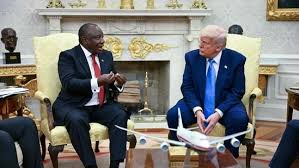South Africa’s second biggest party in the ruling coalition, the Democratic Alliance (DA), has warned that the 30% tariff imposed by former United States President Donald Trump on the country’s exports may remain unless the government changes some domestic race-related policies.
The DA’s leader, John Steenhuisen, made the statement on Monday in an interview. He said the trade restrictions, which have hit several industries hard, go beyond normal trade disagreements and are tied to political and economic issues that the Trump administration considers important.
According to Steenhuisen, South Africa’s attempts to reach a trade agreement with Washington have been ongoing for months but failed to produce a deal before Trump’s deadline. As a result, South Africa’s exports to the United States now face the highest tariff rate in sub-Saharan Africa.
“It is very clear that while we’ve been negotiating on a trade track, the issues with the Trump administration are deeper than that,” Steenhuisen said. “These include matters such as expropriation without compensation, certain labour laws in the country, and racial legislation.”
Steenhuisen explained that the Trump administration is also concerned about South Africa’s membership of the BRICS bloc, a group of countries including Brazil, Russia, India, China, and South Africa, which seeks to provide an alternative to U.S. global influence.
The DA, known for its pro-business stance, has long opposed the Broad-Based Black Economic Empowerment (BEE) Act and other policies aimed at addressing racial inequalities that have persisted since apartheid ended in 1994. The party believes such policies should be replaced with non-racial economic reforms, such as removing bureaucratic bottlenecks and simplifying business licensing to boost economic growth and create jobs.
However, Steenhuisen said he found it unusual that a U.S. administration would link such internal policies to trade negotiations. “Just as we would not seek to interfere in the domestic politics of the United States of America, we would expect that issues that relate to our own sovereignty are also respected,” he noted.
President Cyril Ramaphosa’s African National Congress (ANC), which came to power in 1994 after leading the fight to end white minority rule, is not likely to compromise on BEE or related racial equity policies. For the ANC, BEE is a key strategy to address the legacy of apartheid, under which white South Africans became the wealthiest group while the majority Black population was left with deep economic disadvantages.
The ANC also defends the controversial Expropriation Act signed into law this year. The legislation allows the government, in rare cases, to seize land without compensation for redistribution to address inequality in land ownership. According to the ANC, fears about this law are exaggerated since no land has been taken so far under its provisions.
Steenhuisen acknowledged that such laws could not be changed quickly to meet U.S. demands, as they would require thorough debate in parliament. Still, he suggested that South Africa could improve its relations with Washington by signaling a willingness to move toward policies that the U.S. sees more favorably.
“My worry is that we’re going to continue to negotiate on tariffs and trade, and the 30% is going to remain,” he warned.
The DA leader, who also serves as South Africa’s Minister of Agriculture, highlighted that the agricultural sector is among the hardest hit by the tariffs. This is a concern because agriculture plays a vital role in South Africa’s economy and provides thousands of jobs, especially in rural areas.
Trade analysts say the dispute between South Africa and the U.S. could have wider implications for the country’s economic growth and export competitiveness. If the tariffs remain, it may discourage investment in key industries and reduce foreign exchange earnings from exports to one of South Africa’s largest non-African trade partners.
While negotiations may continue, the gap between the U.S. position and South Africa’s domestic policy stance suggests a long road ahead before the tariff issue is resolved.
